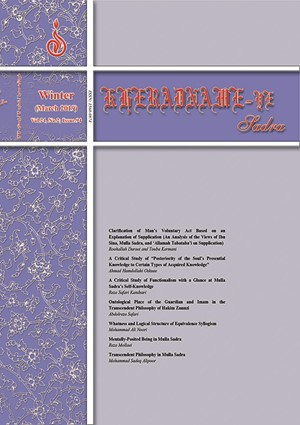-
-
List of Articles
-
Open Access Article
1 - A Critical Study of “Posteriority of the Soul’s Presential Knowledge to Certain Types of Acquired Knowledge”
Ahmad حمداللهی اسکوئی -
Open Access Article
2 - Foreword
Seyyed Mohammad Khamenei -
Open Access Article
3 - Clarification of Man’s Voluntary Act Based on an Explanation of Supplication (An Analysis of the Views of Ibn Sina, Mulla Sadra, and ‘Allamah Tabataba’i on Supplication)
Roohallah Daraei Tuba Kermani -
Open Access Article
4 - A Critical Study of Functionalism with a Glance at Mulla Sadra’s Self-Knowledge
Reza Safari Kandsari -
Open Access Article
5 - Ontological Place of the Guardian and Imam in the Transcendent Philosophy of Hakim Zunuzi
Abdolreza Safari -
Open Access Article
6 - Whatness and Logical Structure of Equivalence Syllogism
Mohammad Ali Nouri -
Open Access Article
7 - Mentally-Posited Being in Mulla Sadra
Reza Mollaei -
Open Access Article
8 - Transcendent Philosophy in Mulla Sadra
Mohammad Sadeq Alipoor
-
The rights to this website are owned by the Raimag Press Management System.
Copyright © 2017-2026







